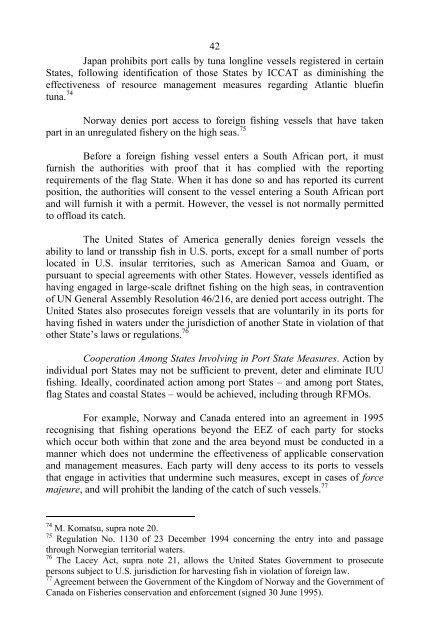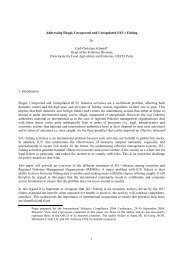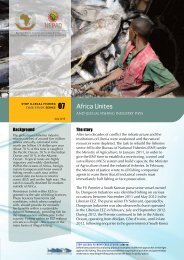Implementation of IPOA/IUU - International MCS Network
Implementation of IPOA/IUU - International MCS Network
Implementation of IPOA/IUU - International MCS Network
Create successful ePaper yourself
Turn your PDF publications into a flip-book with our unique Google optimized e-Paper software.
42Japan prohibits port calls by tuna longline vessels registered in certainStates, following identification <strong>of</strong> those States by ICCAT as diminishing theeffectiveness <strong>of</strong> resource management measures regarding Atlantic bluefintuna. 74Norway denies port access to foreign fishing vessels that have takenpart in an unregulated fishery on the high seas. 75Before a foreign fishing vessel enters a South African port, it mustfurnish the authorities with pro<strong>of</strong> that it has complied with the reportingrequirements <strong>of</strong> the flag State. When it has done so and has reported its currentposition, the authorities will consent to the vessel entering a South African portand will furnish it with a permit. However, the vessel is not normally permittedto <strong>of</strong>fload its catch.The United States <strong>of</strong> America generally denies foreign vessels theability to land or transship fish in U.S. ports, except for a small number <strong>of</strong> portslocated in U.S. insular territories, such as American Samoa and Guam, orpursuant to special agreements with other States. However, vessels identified ashaving engaged in large-scale driftnet fishing on the high seas, in contravention<strong>of</strong> UN General Assembly Resolution 46/216, are denied port access outright. TheUnited States also prosecutes foreign vessels that are voluntarily in its ports forhaving fished in waters under the jurisdiction <strong>of</strong> another State in violation <strong>of</strong> thatother State’s laws or regulations. 76Cooperation Among States Involving in Port State Measures. Action byindividual port States may not be sufficient to prevent, deter and eliminate <strong>IUU</strong>fishing. Ideally, coordinated action among port States – and among port States,flag States and coastal States – would be achieved, including through RFMOs.For example, Norway and Canada entered into an agreement in 1995recognising that fishing operations beyond the EEZ <strong>of</strong> each party for stockswhich occur both within that zone and the area beyond must be conducted in amanner which does not undermine the effectiveness <strong>of</strong> applicable conservationand management measures. Each party will deny access to its ports to vesselsthat engage in activities that undermine such measures, except in cases <strong>of</strong> forcemajeure, and will prohibit the landing <strong>of</strong> the catch <strong>of</strong> such vessels. 7774 M. Komatsu, supra note 20.75 Regulation No. 1130 <strong>of</strong> 23 December 1994 concerning the entry into and passagethrough Norwegian territorial waters.76 The Lacey Act, supra note 21, allows the United States Government to prosecutepersons subject to U.S. jurisdiction for harvesting fish in violation <strong>of</strong> foreign law.77 Agreement between the Government <strong>of</strong> the Kingdom <strong>of</strong> Norway and the Government <strong>of</strong>Canada on Fisheries conservation and enforcement (signed 30 June 1995).
















